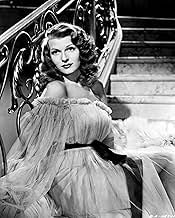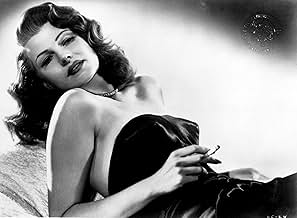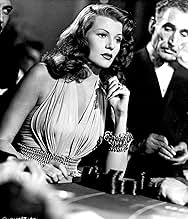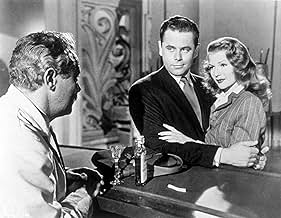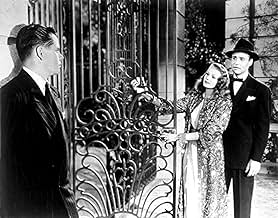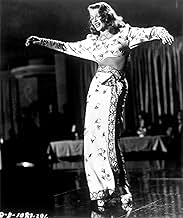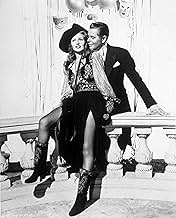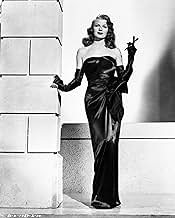Gilda
- 1946
- Tous publics
- 1h 50min
NOTE IMDb
7,6/10
37 k
MA NOTE
Un petit joueur engagé pour travailler dans un casino de Buenos Aires apprend que son ex a épousé son employeur.Un petit joueur engagé pour travailler dans un casino de Buenos Aires apprend que son ex a épousé son employeur.Un petit joueur engagé pour travailler dans un casino de Buenos Aires apprend que son ex a épousé son employeur.
- Réalisation
- Scénario
- Casting principal
- Récompenses
- 4 victoires et 1 nomination au total
Mark Roberts
- Gabe Evans
- (as Robert Scott)
Donald Douglas
- Thomas Langford
- (as Don Douglas)
Julio Abadía
- Newsman
- (non crédité)
- …
Enrique Acosta
- Gambler
- (non crédité)
Ed Agresti
- Nightclub Patron
- (non crédité)
Sam Appel
- Blackjack Dealer
- (non crédité)
Nina Bara
- Girl at Carnival
- (non crédité)
Edward Biby
- Gambler
- (non crédité)
Robert Board
- American Cartel Member
- (non crédité)
Avis à la une
And to think there used to be movies without graphic sex scenes that still got the point across, and how. The sexual tension between Ford and Hayworth in this movie is enough to make you run for the cold showers.
Hayworth is gorgeous and so is Ford. They are so good together and in this movie they are positively great. When great screen lovers are mentioned, I've often wondered why Ford and Hayworth aren't among them.
This is one of my absolute favorites.
Hayworth is gorgeous and so is Ford. They are so good together and in this movie they are positively great. When great screen lovers are mentioned, I've often wondered why Ford and Hayworth aren't among them.
This is one of my absolute favorites.
George Macready is playing the role that most people remember him for - Balin Munson, nightclub millionaire in Argentina, and a man with pure ice in his veins. He has two friends...Johnny (Glenn Ford), who Balin rescues from some toughs, and a slick, sharp little chum hidden in his walking stick - ever ready to cut up people that Balin doesn't like. He also has bigger plans. Men like Balin are not satisfied with successful nightclub/gambling casinos (however successfully they are run). During the Second World War several German and axis industrialists found Balin a comfortable man to do business with. It seems they were not sure if Der Fuhrer would win after all, so they transferred various papers concerning their international holdings in tungsten manufacturing to Balin for him to watch. Big mistake, for Balin realizes that the documents actually put these interests into his fully capable hands. And since he has managed to bribe a local tungsten manufacturer to sell out his plant in Argentina, if Balin can leave without police interference he can put together a cartel that will control the manufacture of such things as light bulb filaments. Sounds preposterous, but that is Balin's goal. He only has two problems: Johnny and Balin's beautiful wife Gilda (Rita Hayworth) apparently know each other and can't stand each other - but he has to leave them in charge of his nightclub while he's away. The other problem is Detective Maurice Obregon (Joseph Calleia) of the Argentine Police Department. Obregon suspects Balin's involvement in this illegal cartel scheme, and is watching him like a hawk.
"Gilda" is the film that made Rita Hayworth a star, and (with "Paths of Glory") gave Macready his justifiable claims to being one of Hollywood's best villains. Ironically many people don't think of Macready as anything but a villain in movies. It is true that in films like "Lady Without a Passport" and "The Big Clock" he was a villain, but he also could play decent people. He tries to help Spencer Tracy escape recapture and execution in "The Seventh Cross", and he is the wise minister and reformer who helps thwart Ray Milland (a.k.a. the Devil) in "Alias Nick Beal". But his Balin is pure, malevolent ice. There has been some suggestion that Balin's relationship with Johnny is actually a homosexual one (the business with the knife in the cane possibly being a metaphor for a male sex organ). Perhaps, but it is a weird friendship of two cynics who (briefly) enjoy each other's cynicism.
Curiously enough the business of the tungsten cartel is rarely discussed in going over the film. Like "Notorious" which came out about the same time, "Gilda" reminded American audiences of the large numbers of Nazis and collaborators who fled to South America in this period. In "Notorious" it was Brazil, and the gang (led by Alex Sebastian - Claude Rains) was fooling around with uranium. Here the idea of such people controlling a useful metal's manufacturing was not probed as much, probably because Balin was set to double cross them. But it is worrying to think of them coming so close to it.
In a discussion of the Warner Baxter film, "Such Men Are Dangerous" I mentioned that (like that film) there is a hint here of the 1928 mysterious death of millionaire Alfred Loewenstein, who managed to fall out of his private airplane over the English Channel. Here, to evade both the Nazis and Calleia, Balin arranges his plane to explode over the ocean (although the audience and Calleia see a figure parachute before it does so). Not quite the same problem as the Loewenstein mystery, but one can see the seed of the idea was there.
I would say this was certainly one of the better film noirs. It even was somewhat thought provoking.
"Gilda" is the film that made Rita Hayworth a star, and (with "Paths of Glory") gave Macready his justifiable claims to being one of Hollywood's best villains. Ironically many people don't think of Macready as anything but a villain in movies. It is true that in films like "Lady Without a Passport" and "The Big Clock" he was a villain, but he also could play decent people. He tries to help Spencer Tracy escape recapture and execution in "The Seventh Cross", and he is the wise minister and reformer who helps thwart Ray Milland (a.k.a. the Devil) in "Alias Nick Beal". But his Balin is pure, malevolent ice. There has been some suggestion that Balin's relationship with Johnny is actually a homosexual one (the business with the knife in the cane possibly being a metaphor for a male sex organ). Perhaps, but it is a weird friendship of two cynics who (briefly) enjoy each other's cynicism.
Curiously enough the business of the tungsten cartel is rarely discussed in going over the film. Like "Notorious" which came out about the same time, "Gilda" reminded American audiences of the large numbers of Nazis and collaborators who fled to South America in this period. In "Notorious" it was Brazil, and the gang (led by Alex Sebastian - Claude Rains) was fooling around with uranium. Here the idea of such people controlling a useful metal's manufacturing was not probed as much, probably because Balin was set to double cross them. But it is worrying to think of them coming so close to it.
In a discussion of the Warner Baxter film, "Such Men Are Dangerous" I mentioned that (like that film) there is a hint here of the 1928 mysterious death of millionaire Alfred Loewenstein, who managed to fall out of his private airplane over the English Channel. Here, to evade both the Nazis and Calleia, Balin arranges his plane to explode over the ocean (although the audience and Calleia see a figure parachute before it does so). Not quite the same problem as the Loewenstein mystery, but one can see the seed of the idea was there.
I would say this was certainly one of the better film noirs. It even was somewhat thought provoking.
This film is a great example of a very good film whose style and sense of sex appeal actually surpasses the plot. Now this isn't to say that the film has a bad plot--no, it's good enough. It's just that the wonderfully Noir-like dialog and Rita Hayworth's incredible sex appeal are what you are left with when the film is over--not the plot! Despite being a Rita Hayworth starring vehicle, she actually doesn't take up the lion's share of the screen. In fact, she doesn't even make an appearance until about 20 minutes into the film! This task of anchoring the film is given to a young and very effective Glenn Ford--who does a fine job as a street-wise but smart young punk wanting to make it to "the big leagues" and stop hustling for small change. When Ford meets up with George Macready, it's an incredibly memorable Noir moment. The crackling dialog between them and Ford's not even bothering to thank Macready for saving his life is so stylish and made the Film Noir lover within me happy! Later, in another great scene, Ford has just been worked over by a bouncer from a high class casino when he finds out this is Macready's business! Instead of being angry, both strike up a working arrangement--and Ford dispatches the bouncer is a brutal manner! Only later, after Ford has been Macready's right-hand man for some time does Hayworth enter the film. The reaction to her arrival indicates that there is SOME unfinished business between the two--but now Rita is Macready's new wife! Now this brings me to one problem about the film. It isn't an insurmountable problem, but supposedly Rita and Glenn had been lovers some time before and their meeting now was by pure chance. However, considering that they were in love in New York and the film takes place in Argentina, you are left wondering "what are the odds?". Despite this, you aren't left wondering for long because of the sparkling dialog and chemistry between Rita and Glenn. In other words, because of all the steamy moments on the screen, you tend to forget the occasional inconsistency of the plot. And, speaking of steam, there is a lot. Despite apparently being pregnant during the shoot, Miss Hayworth managed to create the sexiest portrayal on film from the era...period. Her languid singing, her amazing dresses that looked like they were glued on and the dialog between her and Ford all created an amazing atmosphere that just can't be equaled. Sure, the plot was fine, but the mood--that's what makes this an exceptional film.
By the way, it is rather fascinating to see that in many ways this film mirrored the real-life antics of Rita--especially in regard to how she had a devil of a time picking men! Both Gilda and Rita both seemed to have a lot of sex destructiveness within them.
By the way, it is rather fascinating to see that in many ways this film mirrored the real-life antics of Rita--especially in regard to how she had a devil of a time picking men! Both Gilda and Rita both seemed to have a lot of sex destructiveness within them.
Rita Hayworth positively sizzles as Gilda in this film-noir classic. From her initial hair-tossing scene to her near striptease while she sings "Put the Blame on Mame," Hayworth is captivating and more than convincing as the object of every man's desires. However, beyond the overtly heterosexual lures of Ms. Hayworth lurks a complex and ambiguous romantic triangle that provides more intrigue than the surface plot, which involves a gambling casino that is a front for shady operations that originated in a recently defeated, Fascist country.
Hayworth may either be the intruding wedge that comes between Glenn Ford and George Macready or the object of both men's romantic interests. From the initial meeting between Ford as two-bit gambler Johnny Farrell and Macready as Ballin Mundson the casino owner, an ambiguous, possibly homo-erotic, attraction is established between the two men. The lingering looks that they exchange can be read in several ways, but Bogie never looked into Cagney's eyes like Ford looks into Macready's. After Ford begins to work for Macready, his devoted care and slavish attention to his boss's needs exceed the bounds of employee and employer. When Hayworth moves into Macready's home as his new wife, Ford returns the key to the house as though he were a jilted lover. Ford's increasing jealousy becomes apparent after Hayworth's arrival on the scene, but it is unclear of whom he is jealous, Hayworth or Macready or possibly both. Perhaps Ford's character is as unsure of his own feelings as is the viewer, which makes the ambiguity even more intriguing. Macready's jealousy also grows as the heat between Ford and Hayworth intensifies, but, again, it is ambiguous of whom he is jealous.
With a dazzling performance by Hayworth, excellent black-and-white photography by Rudoph Mate, fine direction by Charles Vidor, and layers of psychological possibilities to ponder, "Gilda" is as golden as its title suggests.
Hayworth may either be the intruding wedge that comes between Glenn Ford and George Macready or the object of both men's romantic interests. From the initial meeting between Ford as two-bit gambler Johnny Farrell and Macready as Ballin Mundson the casino owner, an ambiguous, possibly homo-erotic, attraction is established between the two men. The lingering looks that they exchange can be read in several ways, but Bogie never looked into Cagney's eyes like Ford looks into Macready's. After Ford begins to work for Macready, his devoted care and slavish attention to his boss's needs exceed the bounds of employee and employer. When Hayworth moves into Macready's home as his new wife, Ford returns the key to the house as though he were a jilted lover. Ford's increasing jealousy becomes apparent after Hayworth's arrival on the scene, but it is unclear of whom he is jealous, Hayworth or Macready or possibly both. Perhaps Ford's character is as unsure of his own feelings as is the viewer, which makes the ambiguity even more intriguing. Macready's jealousy also grows as the heat between Ford and Hayworth intensifies, but, again, it is ambiguous of whom he is jealous.
With a dazzling performance by Hayworth, excellent black-and-white photography by Rudoph Mate, fine direction by Charles Vidor, and layers of psychological possibilities to ponder, "Gilda" is as golden as its title suggests.
It's Rita Hayworth in probably her most memorable role. Her portrayal of Gilda is rightly remembered as a classic performance. But Gilda the character is much better than Gilda the movie. Hayworth may be a sensation but everything around her in this movie is not quite up to her standard. Not a bad movie by any means but no all-time classic either. It's one of those movies where a performance is remembered so fondly that perhaps people remember the movie as being somewhat better than it actually is. As good as Hayworth is she's not enough to hide the movie's flaws.
Our story unfolds in Buenos Aires. Which as you watch the movie is easy to forget because there is absolutely no South American flavor to the proceedings. The story might as well be set in Milwaukee. Anyhow small-time gambler and successful cheater Johnny Farrell somehow finds himself running a high-class casino after the casino's owner, Ballin Mundson, takes a liking to him. Everything is going swimmingly until one day, completely out of the blue, Ballin returns home from a trip with a beautiful new wife in tow. This woman is going to cause all kinds of complications. This woman of course is Gilda and right from the start, from her first memorable moment on the screen, Hayworth takes hold of the movie. Gilda's a fascinating character with so much lurking under the surface. And what's on the surface ain't so bad either. Not for nothing was Hayworth the era's most popular pinup girl. A shame then that the movie can't take full advantage of the allure and talents of its star.
Hayworth is vibrant, exciting, bursting with life. The movie is not. In playing Johnny Farrell, the character we unfortunately spend more time with than we do with Gilda, Glenn Ford comes across as being somewhat dull. And his character is rather unlikable. The story contains some elements which fall flat. There's something about a tungsten cartel which involves some angry Germans. This of course has nothing to do with Gilda. Can we just get back to Gilda? Please? Somewhere along the way the story really gets bogged down and not even Hayworth can fully rescue it. Everyone will remember Hayworth's big moments. She makes quite the impression with her famous singing and dancing. Well dancing anyway as the singing voice isn't hers. But nevertheless that famous number, "Put the Blame on Mame", is quite the spectacle. Now who to put the blame on for surrounding the fabulous Hayworth with an otherwise very ordinary movie? You'll love Rita. Love the movie? That's a stretch.
Our story unfolds in Buenos Aires. Which as you watch the movie is easy to forget because there is absolutely no South American flavor to the proceedings. The story might as well be set in Milwaukee. Anyhow small-time gambler and successful cheater Johnny Farrell somehow finds himself running a high-class casino after the casino's owner, Ballin Mundson, takes a liking to him. Everything is going swimmingly until one day, completely out of the blue, Ballin returns home from a trip with a beautiful new wife in tow. This woman is going to cause all kinds of complications. This woman of course is Gilda and right from the start, from her first memorable moment on the screen, Hayworth takes hold of the movie. Gilda's a fascinating character with so much lurking under the surface. And what's on the surface ain't so bad either. Not for nothing was Hayworth the era's most popular pinup girl. A shame then that the movie can't take full advantage of the allure and talents of its star.
Hayworth is vibrant, exciting, bursting with life. The movie is not. In playing Johnny Farrell, the character we unfortunately spend more time with than we do with Gilda, Glenn Ford comes across as being somewhat dull. And his character is rather unlikable. The story contains some elements which fall flat. There's something about a tungsten cartel which involves some angry Germans. This of course has nothing to do with Gilda. Can we just get back to Gilda? Please? Somewhere along the way the story really gets bogged down and not even Hayworth can fully rescue it. Everyone will remember Hayworth's big moments. She makes quite the impression with her famous singing and dancing. Well dancing anyway as the singing voice isn't hers. But nevertheless that famous number, "Put the Blame on Mame", is quite the spectacle. Now who to put the blame on for surrounding the fabulous Hayworth with an otherwise very ordinary movie? You'll love Rita. Love the movie? That's a stretch.
Le saviez-vous
- AnecdotesThere is a rumour that this film is the only time Rita Hayworth's real singing voice is heard, but that is not true. According to the bonus features from the DVD, Hayworth actually never recorded her own singing voice and was a talented lip-syncher. Anita Ellis dubbed almost all of her singing in this film. Hayworth always wanted to do her own singing, and Columbia Pictures chief Harry Cohn paid for her voice lessons, but she never developed a voice he considered strong enough to be used; Hayworth remained bitter about that for the rest of her life.
- GaffesWhen Farrell asks to cut the deck at the blackjack table, he shuffles the deck prior to the cut; this is not allowed.
- Citations
Gilda: You do hate me, don't you, Johnny?
Johnny Farrell: I don't think you have any idea of how much.
Gilda: Hate is a very exciting emotion. Haven't you noticed? Very exciting. I hate you too, Johnny. I hate you so much I think I'm going to die from it. Darling...
[they kiss passionately]
Gilda: I think I'm going to die from it.
- ConnexionsEdited into Head (1968)
Meilleurs choix
Connectez-vous pour évaluer et suivre la liste de favoris afin de recevoir des recommandations personnalisées
- How long is Gilda?Alimenté par Alexa
Détails
Box-office
- Montant brut mondial
- 5 999 $US
- Durée1 heure 50 minutes
- Couleur
- Rapport de forme
- 1.37 : 1
Contribuer à cette page
Suggérer une modification ou ajouter du contenu manquant



